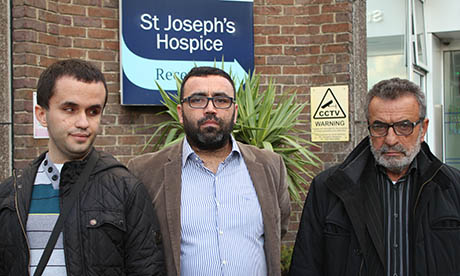Family of prisoner dying in Hackney hospice beg for his release

Tolga Karatas, Ali Karatas and Ismiel Karatas outside St Joseph’s Hospice. Photograph: Ella Jessel
The family of a terminally ill prisoner is pleading with the authorities to allow him to spend his final hours at home.
Sabri Karatas is in St Joseph’s Hospice in the final stages of bowel cancer, and until last night was handcuffed to a prison officer.
The 36 year-old from Homerton was told by doctors last Thursday that he had only ten days left to live.
In May 2015 Karatas was handed a 12-year sentence after he admitted conspiracy to supply 20 kilos of heroin.
He also pleaded guilty to possession of a prohibited weapon and two counts of possession of ammunition without a certificate.
He was sent to Pentonville Prison to serve his sentence.
Still human
Despite being unable to move unaided and requiring constant care, prison authorities had refused to unchain him for security reasons.
The Hackney Citizen contacted the prison authorities yesterday afternoon asking why Karatas was chained to a guard and his handcuffs were subsequently removed late last night.
Ali Karatas, 45, who has started a petition to bring his younger brother home, told the Hackney Citizen that his treatment had been “barbaric”.
He said: “This is meant to be a civilised country. This is happening in the UK, in 2015 – how can this be?”
He questioned the prison’s assessment of his brother as ‘high risk’ asking: “How can he be at ‘high risk’ of running off? He is in a private room with a lock and two security guards next to him.”
“I’m losing my brother – he might be a criminal, but he is still human.”
In September, Karatas’ legal team urged three judges to cut his sentence so he could spend his final days with his family.
The judge reduced his sentence to seven years as “an act of mercy” but said his crime was too serious to justify releasing him.
Dignified death
In a letter sent to the prison authorities from Whittington Hospital where Karatas was treated, doctors recommended that his sentence be reviewed as the patient had only weeks to live.
The letter reads: “While in hospital we feel that the decision to handcuff him to a prison officer should also be re-considered to allow him a dignified death”.
The Karatas family have complained about Sabri’s treatment in prison, claiming he was sent back to prison just five days after having major surgery.
They also claim the prison did not allow for the correct administering of his chemotherapy treatment, and that once his health began to deteriorate an ambulance was called only when his body had started to “shut down”.
Ali Karatas told the Hackney Citizen: “He had a huge operation where they cut 30cm into his bowel and removed the tumour.
“He was supposed to be in hospital for two weeks but the prison brought him back after five days. They put him in health care for one day and then he was returned to his cell.
“Within five days he had an infection and the cancer had spread to his body, to his legs and to his lungs.
“He then went into a coma, so they took him back to Whittington Hospital where he was kept for 31 days. We almost lost him there.”
In June doctors gave Sabri a year to 18 months to live if he began chemotherapy.
Ali Karatas claims his brother’s second round of treatment was administered eight days late and described the family’s frantic attempts to get him to hospital: “Medical reports predicted he had one or two years to live, but he doesn’t even have that- he has 10 days.
“I don’t want anyone else to pay this price. I want to shout as loud as I can.”
Restraint should be ‘proportionate’
The family’s MP Meg Hillier wrote to the prison in July to raise their concerns but received no reply despite her office staff repeatedly telephoning the prison governer’s office.
In a report by the Prison and Probation Ombudsman (PPO) the concordat notes that using restraints on terminally or seriously ill patients should be considered “inhumane” except when justified by security considerations.
It continues: “Levels of restraint used on prisoners must at all times be proportionate to the perceived security risks and be balanced by consideration of care and decency for the prisoner.”
St Joseph’s Hospice said it could not comment for reasons of patient confidentiality.
A Prison Service spokesperson said: “We manage the care of prisoners who are sick as sensitively as possible but public safety remains our priority.
“That is why we review an individual’s security arrangements on a daily basis to take account of changing factors including medical advice.”
